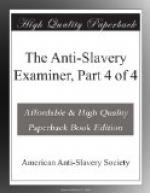[Footnote 21: Gal. iii. 28.]
“Where the spirit of the Lord is,” exclaims the same apostle, with his eye upon the condition and relations of the church, “where the spirit of the Lord is, THERE IS LIBERTY.” Where, then, may we reverently recognize the presence, and bow before the manifested power, of this spirit? There, where the laborer may not choose how he shall be employed!—in what way his wants shall be supplied!—with whom he shall associate!—who shall have the fruit of his exertions! There, where he is not free to enjoy his wife and children! There, where his body and his soul, his very “destiny,"[22] are placed altogether beyond his control! There, where every power is crippled, every energy blasted, every hope crushed! There, where in all the relations and concerns of life, he is legally treated as if he had nothing to do with the laws of reason, the light of immortality, or the exercise of will! Is the spirit of the Lord there, where liberty is decried and denounced, mocked at and spit upon, betrayed and crucified! In the midst of a church which justified slavery, which derived its support from slavery, which carried on its enterprises by means of slavery, would the apostle have found the fruits of the Spirit of the Lord! Let that Spirit exert his influences, and assert his authority, and wield his power, and slavery must vanish at once and for ever.
[Footnote 22: “The legislature (of South Carolina) from time to time, has passed many restricted and penal acts, with a view to bring under direct control and subjection the DESTINY of the black population.” See the Remonstrance of James S. Pope and 352 others against home missionary efforts for the benefit of the enslaved—a most instructive paper.]
In more than one connection, the apostle James describes Christianity as “the law of liberty.” It is, in other words, the law under which liberty cannot but live and flourish—the law in which liberty is clearly defined, strongly asserted, and well protected. As the law of liberty, how can it be consistent with the law of slavery? The presence and the power of this law are felt wherever the light of reason shines. They are felt in the uneasiness and conscious degradation of the slave, and in the shame and remorse which the master betrays in his reluctant and desperate efforts to defend himself. This law it is which has armed human nature against the oppressor. Wherever it is obeyed, “every yoke is broken.”




